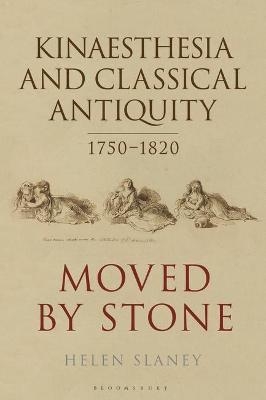
Kinaesthesia and Classical Antiquity 1750–1820
Moved by Stone
Seiten
2020
Bloomsbury Academic (Verlag)
978-1-350-14402-6 (ISBN)
Bloomsbury Academic (Verlag)
978-1-350-14402-6 (ISBN)
This book argues that touch and movement played a significant role, long overlooked, in generating perceptions of ancient material culture in the late 18th century. At this time the reception of classical antiquity had been transformed. Interactions with material culture – ruins, sculpture, and artefacts – formed the core of this transformation. Some such interactions were proto-archaeological, such as the Dilettanti expeditions to Athens and Asa Minor; others were touristic, seen in the guidebooks consulted by travellers to Rome and the diaries they composed; and others creative, resulting in novels, poetry, and dance performances. Some involved the reproduction of experience in a gallery or museum setting. What all encounters with ancient material culture had in common, however, is their haptic sensory basis.
The sense typically associated with the Enlightenment is vision, but this has obscured the equally important contribution made by touch and movement to the way in which a newly materialised Graeco-Roman world was perceived. Kinaesthesia, or the sense of self-movement, is rarely recognised in its own right, but because all encounters with sites and objects are embodied, and all embodiment takes place in motion, this sense is vital to forming more abstract or imaginative impressions. Theories of embodied cognition propose that all intellectual processes are also physical. This book shows how ideas about classical antiquity in the volatile milieu of the late 18th century developed as a result of diverse kinaesthetic relationships.
The sense typically associated with the Enlightenment is vision, but this has obscured the equally important contribution made by touch and movement to the way in which a newly materialised Graeco-Roman world was perceived. Kinaesthesia, or the sense of self-movement, is rarely recognised in its own right, but because all encounters with sites and objects are embodied, and all embodiment takes place in motion, this sense is vital to forming more abstract or imaginative impressions. Theories of embodied cognition propose that all intellectual processes are also physical. This book shows how ideas about classical antiquity in the volatile milieu of the late 18th century developed as a result of diverse kinaesthetic relationships.
Helen Slaney is a researcher in Classics and Program Manager for Graduate Research at La Trobe University, Australia. Her publications include The Senecan Aesthetic: A Performance History (2015) and Seneca: Medea (Bloomsbury, 2019), as well as numerous articles on the reception of antiquity in the early-modern world.
Introduction: The science of sensuous cognition
Part 1: Approaches
1. Emma Hamilton’s Attitudes
2. Herder’s ‘Feeling Imagination’
3. Charlotte Eaton’s Rome as Theatre
4. Goethe’s ‘Seeing Hand’
Part 2: Apprehensions
5. Time Travellers
6. Frankenstein’s Venus
7. Belongings in Museums
Part 3: Appreciations
8. Roman Novels
9. Forever Young
10. Mary Shelley’s ‘Desart Ruins’
Conclusion
Bibliography
Notes
Index
| Erscheinungsdatum | 04.09.2020 |
|---|---|
| Reihe/Serie | Bloomsbury Studies in Classical Reception |
| Zusatzinfo | 15 bw illus |
| Verlagsort | London |
| Sprache | englisch |
| Maße | 156 x 234 mm |
| Gewicht | 581 g |
| Themenwelt | Kunst / Musik / Theater ► Kunstgeschichte / Kunststile |
| Geschichte ► Allgemeine Geschichte ► Neuzeit (bis 1918) | |
| Geisteswissenschaften ► Philosophie ► Philosophie der Neuzeit | |
| ISBN-10 | 1-350-14402-9 / 1350144029 |
| ISBN-13 | 978-1-350-14402-6 / 9781350144026 |
| Zustand | Neuware |
| Haben Sie eine Frage zum Produkt? |
Mehr entdecken
aus dem Bereich
aus dem Bereich
Europa 1848/49 und der Kampf für eine neue Welt
Buch | Hardcover (2023)
DVA (Verlag)
48,00 €
Giordano Bruno - ein ketzerisches Leben
Buch | Hardcover (2024)
C.H.Beck (Verlag)
29,90 €


